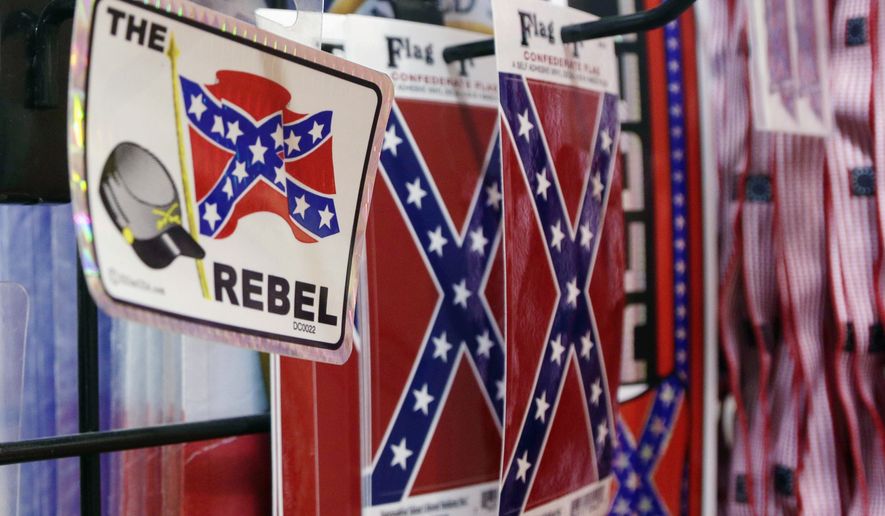DENTON, Md. — The decision by Wal-Mart and other major retailers to ban the sale of the Confederate battle flag was met with shrugs and rolling eyes Wednesday in this small town on Maryland’s Eastern Shore.
“It hasn’t hurt anybody. It’s a flag,” snickered Felix Gardner, 66, who is black. “What difference does it make? It doesn’t make one iota of difference in what [racist] people believe.”
He said the shooting massacre last week at a historic black church in Charleston, South Carolina, was a tragedy. But he said the killings were not about the flag of the Old South.
“They fought the Civil War, and they lost,” said the retired federal worker. “The flag doesn’t really faze me. That’s before we were born.”
Many at the Wal-Mart in Denton and another store in nearby Easton said they understood why the often-maligned retail giant wanted to make a strong statement against racism.
They also said they would shop at Wal-Mart regardless of whether it sold Confederate flags.
“It doesn’t affect me either way,” said Letecia Franco, 48, a black woman of Puerto Rican descent. “Everyone should have a right to want what they want, whether it’s a flag or your culture — whatever you want to choose.”
The backlash against the flag and other symbols of the Confederacy came fast and furious after a young white man, who has ties to white supremacists and posed in photos with the Confederate flag, was charged with nine counts of murder in the attack at Emanuel African Methodist Episcopal Church in Charleston.
Wal-Mart, Amazon, eBay, Sears, Target and Etsy yanked the merchandise off the shelves.
On Wednesday, Alabama Gov. Robert Bentley ordered the removal of four Confederate battle flags from a memorial at his state Capitol, but the Pentagon refused to join the stampede to dispose of traces of Confederate history, saying top brass were not considering renaming bases and installations named after Confederate military leaders.
Brig. Gen. Malcolm Frost, chief of Army public affairs, said in a statement that every Army base is named for a soldier “who holds a place in our military history.”
“Accordingly, these historic names represent individuals, not causes or ideologies. It should be noted that the naming occurred in the spirit of reconciliation, not division,” he said.
Former Sen. James Webb of Virginia also stepped forward to defend the flag and urge respect for the “complicated” history of the Civil War.
“This is an emotional time, and we all need to think through these issues with a care that recognizes the need for change but also respects the complicated history of the Civil War,” Mr. Webb, who is weighing a 2016 presidential run on the Democratic side, wrote in a Facebook post. “The Confederate Battle Flag has wrongly been used for racist and other purposes in recent decades. It should not be used in any way as a political symbol that divides us.
“But we should also remember that honorable Americans fought on both sides in the Civil War, including slave holders in the Union Army from states such as Missouri, Kentucky, Maryland and Delaware, and that many non-slave holders fought for the South,” Mr. Webb wrote. “It was in recognition of the character of soldiers on both sides that the federal government authorized the construction of the Confederate Memorial 100 years ago, on the grounds of Arlington National Cemetery.”
He called for Americans to pull together during this difficult time and “recognize once more that our complex multicultural society is founded on the principle of mutual respect.”
It wasn’t the first time Mr. Webb came to the flag’s defense.
In his book, “Born Fighting,” Mr. Webb railed against “revisionist politicians and academics” who he said oversimplified the Civil War and tried to “defame the entire Confederate Army in a move that can only be termed the Nazification of the Confederacy.”
“But what many historians miss — and what those who react so strongly to seeing Confederate battle flags on car bumpers and in the yards of descendants of Confederate veterans do not understand — is that slavery was emphatically not the reason that most individual southerners fought so long and hard, and at such overwhelming cost,” he wrote in the book.
His sentiments were shared by John Hagglund, 22, a waterman from Hurlock, Maryland, who was shopping at the Wal-Mart in Easton.
He blasted Wal-Mart for banning the flag, saying he loves the Confederate flag — not because it represents racism but because “it is part of our history.”
“When you take a part of history off the shelves, it takes a toll on everybody,” said Mr. Hagglund.
Still, he said he would continue to shop at Wal-Mart.
South Carolina Gov. Nikki Haley backed plans to remove the Confederate flag from the Statehouse grounds on Tuesday. Virginia Gov. Terry McAuliffe and Maryland Gov. Larry Hogan took steps to cancel license plates in their states that bear the battle flag emblem.
• David Sherfinski reported from Washington, with additional reporting by Jacqueline Klimas.
• S.A. Miller can be reached at smiller@washingtontimes.com.




Please read our comment policy before commenting.